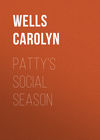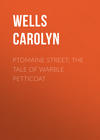Читать книгу: «Marjorie's Vacation», страница 2
CHAPTER III
ON THE ROOF
"Why, Mopsy Maynard," exclaimed her mother, as Marjorie danced into the house, smiling and dishevelled, "what a looking head! Please go straight to your room, and make yourself tidy before supper time."
"Yes, indeed, Mother, but just listen a minute! Uncle Steve has a new horse, a black one, and there are a hundred million little chickens, in the queerest kind of a thing, but I can't remember its name,—it's something like elevator."
"Incubator, perhaps," suggested her mother.
"Yes, that's it; and oh, Mother, it's so funny! Do come out and see it, won't you?"
"Not to-night, child; and now run up to your room and tie up your hair."
Marjorie danced upstairs, singing as she went, but when she reached the door of the room she was accustomed to use, she stopped her singing and stood in the doorway, stock-still with sheer bewilderment.
For somehow the room had been entirely transformed, and looked like a totally different apartment.
The room was in one of the wings of the house, and was large and square, with windows on two sides. But these had been ordinary windows, and now they were replaced by large, roomy bay windows, with glass doors that reached from floor to ceiling, and opened out on little balconies. In one of these bay windows was a dear little rocking-chair painted white, and a standard work-basket of dainty white and green wicker, completely furnished with sewing materials. In the other bay window was a dear little writing-desk of bird's-eye maple, and a wicker chair in front of it. The desk was open, and Marjorie could see all sorts of pens and pencils and paper in fascinating array.
But these were only a few of the surprises. The whole room had been redecorated, and the walls were papered with a design of yellow daffodils in little bunches tied with pale green ribbon. The woodwork was all painted white, and entirely around the room, at just about the height of Marjorie's chin, ran a broad white shelf. Of course this shelf stopped for the windows and doors, but the room was large, and there was a great deal of space left for the shelf. But it was the things on the shelf that attracted Marjorie's attention. One side of the room was devoted to books, and Marjorie quickly recognized many of her old favorites, and many new ones. On another side of the room the shelf was filled with flowers, some blooming gayly in pots, and some cut blossoms in vases of water. On a third side of the room the shelf held birds, and this sight nearly took Marjorie's breath away. Some were in gilt cages, a canary, a goldfinch, and another bird whose name Marjorie did not know. And some were stuffed birds of brilliant plumage, and mounted in most natural positions on twigs or branches, or perched upon an ivy vine which was trained along the wall. The fourth side was almost empty, and Marjorie knew at once that it was left so in order that she might have a place for such treasured belongings as she had brought with her.
"Well!" she exclaimed, although there was no one there to hear her. "Well, if this isn't the best ever!" She stood in the middle of the room, and turned slowly round and round, taking in by degrees the furnishings and adornment. All of the furniture was new, and the brass bed and dainty dressing-table seemed to Marjorie quite fit for any princess.
"Well!" she exclaimed again, and as she turned around this time she saw the older people watching her from the hall.
"Oh, Grandma Sherwood!" she cried, and running to the old lady, proceeded to hug her in a way that was more affectionate than comfortable.
"Do you like it?" asked Grandma, when she could catch her breath.
"Like it! It's the most beautiful, loveliest, sweetest room in the whole world! I love it! Did you do it all for me, Grandma?"
"Yes, Midget; that is, I fixed up the room, but for the shelf you must thank Uncle Steve. That is his idea entirely, and he superintended its putting up. You're to use it this year, and next year Kitty can have her dolls and toys on it, and then the year after, King can use it for his fishing-tackle and boyish traps. Though I suppose by that time Rosamond will be old enough to take her turn."
"Then I can't come again for four years," exclaimed Marjorie, with an expression of consternation on her face.
"Not unless you come two at a time," said Grandma; "and I doubt if your mother would consent to that."
"No, indeed," said Mrs. Maynard; "it's hard enough to lose one of the flock, without losing two."
"Well, I'll have a good time with it this summer, anyway," said Marjorie; "can't we unpack my trunk now, Mother, so I can put my pearl pen in my desk; and my clock, that Rosy Posy gave me, on the shelf; and hang up my bird picture on the wall?"
"Not just now," said her mother, "for it is nearly supper time, and you must transform yourself from a wild maid of the woods into a decorous little lady."
The transformation was accomplished, and it was not very long before a very neat and tidy Marjorie walked sedately downstairs to the dining-room. Her white dress was immaculate; a big white bow held the dark curls in place, and only the dancing eyes betrayed the fact that it was an effort to behave so demurely.
"Well, Midget," said Uncle Steve, as they were seated at the supper table, "does the old place look the same?"
"No, indeed, Uncle; there are lots of changes, but best of all is my beauty room. I never saw anything so lovely; I just want to stay up there all the time."
"I thought you'd like that shelf. Now you have room for all the thousand and one bits of rubbish that you accumulate through the summer."
"'Tisn't rubbish!" exclaimed Marjorie, indignantly; "it's dear little birds' nests, and queer kinds of rocks, and branches of strange trees and grasses and things."
"Well, I only meant it sounds to me like rubbish," said Uncle Steve, who loved to tease her about her enthusiasms.
But she only smiled good-naturedly, for she well knew that Uncle Steve was the very one who would take her for long walks in the woods, on purpose to gather this very "rubbish."
The next day Marjorie was up bright and early, quite ready for any pleasure that might offer itself.
Her mother went back home that day, and though Marjorie felt a little sad at parting, yet, after all, Grandma Sherwood's house was like a second home, and there was too much novelty and entertainment all about to allow time for feeling sad.
Moreover, Marjorie was of a merry, happy disposition. It was natural to her to make the best of everything, and even had she had reasons for being truly miserable, she would have tried to be happy in spite of them.
So she bade her mother good-by, and sent loving messages to all at home, and promised to write often.
"Remember," said her mother, as a parting injunction, "to read every morning the list I gave you, which includes all my commands for the summer. When I see you again I shall expect you to tell me that you obeyed them all."
"I will try," said Marjorie; "but if it is a long list I may forget some of them sometimes. You know, Mother, I AM forgetful."
"You are, indeed," said Mrs. Maynard, smiling; "but if you'll try I think you'll succeed, at least fairly well. Good-by now, dear; I must be off; and do you go at once to your room and read over the list so as to start the day right."
"I will," said Marjorie, and as soon as she had waved a last good-by, and the carriage had disappeared from view, she ran to her room, and sitting down at her pretty desk, unfolded the list her mother had given her.
To her great surprise, instead of the long list she had expected to find, there were only two items. The first was, "Keep your hands clean, and your hair tidy"; and the other read, "Obey Grandma implicitly."
"Well," thought Marjorie to herself, "I can easily manage those two! And yet," she thought further, with a little sigh, "they're awfully hard ones. My hands just WON'T keep clean, and my hair ribbon is forever coming off! And of course I MEAN to obey Grandma always; but sometimes she's awful strict, and sometimes I forget what she told me."
But with a firm resolve in her heart to do her best, Marjorie went downstairs, and went out to play in the garden.
Some time later she saw a girl of about her own age coming down the path toward her. She was a strange-looking child, with a very white face, snapping black eyes, and straight wiry black hair, braided in two little braids, which stood out straight from her head.
"Are you Marjorie?" she said, in a thin, piping voice. "I'm Molly Moss, and I've come to play with you. I used to know Kitty."
"Yes," said Marjorie, pleasantly, "I'm Marjorie, and I'm Kitty's sister. I'm glad you came. Is that your kitten?"
"Yes," said Molly, as she held up a very small black kitten, which was indeed an insignificant specimen compared to the Persian beauty hanging over Marjorie's arm.
"It's a dear kitten," Molly went on. "Her name is Blackberry. Don't you like her?"
"Yes," said Marjorie, a little doubtfully; "perhaps she can be company for Puff. This is my Puff." Marjorie held up her cat, but the two animals showed very little interest in one another.
"Let's put them to sleep somewhere," said Molly, "and then go and play in the loft."
The kittens were soon deposited in the warm kitchen, and the two girls ran back to the barn for a good play. Marjorie had already begun to like Molly, though she seemed rather queer at first, but after they had climbed the ladder to the warm sweet-smelling hay-loft, they grew better acquainted, and were soon chattering away like old friends.
Molly was not at all like Stella Martin. Far from being timid, she was recklessly daring, and very ingenious in the devising of mischief.
"I'll tell you what, Mopsy," she said, having already adopted Marjorie's nickname, "let's climb out of the window, that skylight window, I mean, onto the roof of the barn, and slide down. It's a lovely long slide."
"We'll slide off!" exclaimed Marjorie, aghast at this proposition.
"Oh, no, we won't; there's a ledge at the edge of the roof, and your heels catch that, and that stops you. You CAN'T go any further."
"How do you get back?"
"Why, scramble back up the roof, you know. Come on, it's lots of fun."
"I don't believe Grandma would like it," said Marjorie, a little doubtfully.
"Oh, pshaw, you're afraid; there's no danger. Come on and try it, anyhow."
Now Marjorie did not like to be called afraid, for she really had very little fear in her disposition. So she said: "Well, I'll go up the ladder and look out, and if it looks dangerous I won't do it."
"Not a bit of danger," declared Molly. "I'll go up first." Agile as a sprite, Molly quickly skipped up the ladder, and opened the trap-door in the barn roof. Sticking her head up through, she soon drew her thin little body up after it and called to Marjorie to follow. Marjorie was a much heavier child, but she sturdily climbed the ladder, and then with some difficulty clambered out on the roof.
"Isn't it gay?" cried Molly, and exhilarated by the lofty height, the novel position, and the excitement of the moment, Marjorie thought it was.
"Now," went on Molly, by way of instruction, "sit down beside me right here at the top. Hang on with your hands until I count three and then let go, and we'll slide straight down the roof."
Marjorie obeyed directions, and sat waiting with a delightful feeling of expectancy.
"One, two, three!" counted Molly, and at the last word the two girls let go their grasp and slid.
Swiftly and lightly the slender little Molly slid to the gutter of the eaves of the roof, caught by her heels, and stopped suddenly, leaning against the slanted roof, comfortably at her ease.
Not so Marjorie. She came swiftly down, and, all unaccustomed to motion of this sort, her feet struck the gutter, her solid little body bounced up into the air, and instead of falling backward again, she gave a frightened convulsive movement, and fell headlong to the ground.
Quick as a flash, Molly, when she saw what had happened, scrambled back up the roof with a wonderful agility, and let herself down through the skylight, and down the ladder like lightning. She rushed out of the barn, to where Marjorie lay, and reached her before Carter did, though he came running at the first sounds of Marjorie's screams.
"I'm not hurt much," said Marjorie, trying to be brave; "if you'll help me, Carter, I think I can walk to the house."
"Walk nothin'," growled Carter; "it's Miss Mischief you are for sure! I thought you had outgrown your wild ways, but you're just as bad as ever! What'll your grandma say?"
Molly stood by, decidedly scared. She didn't know how badly Marjorie was hurt, and she longed to comfort her, and tell her how sorry she was that she had urged her to this mischief, but Carter gave her no opportunity to speak. Indeed, it was all she could do to keep up with the gardener's long strides, as he carried Marjorie to the house. But Molly was no coward, and she bravely determined to go to the house with them, and confess to Mrs. Sherwood that she was to blame for the accident.
But when they reached the door, and Grandma Sherwood came out to meet them, she was so anxious and worried about Marjorie that she paid little attention to Molly's efforts at explanation.
"What are you trying to say, child?" she asked hastily of Molly, who was stammering out an incoherent speech. "Well, never mind; whatever you have to say, I don't want to hear it now. You run right straight home; and if you want to come over to-morrow to see how Marjorie is, you may, but I can't have you bothering around here now. So run home."
And Molly ran home.
CHAPTER IV
A PAPER-DOLL HOUSE
The result of Marjorie's fall from the roof was a sprained ankle. It wasn't a bad sprain, but the doctor said she must stay in bed for several days.
"But I don't mind very much," said Marjorie, who persisted in looking on the bright side of everything, "for it will give me a chance to enjoy this beautiful room better. But, Grandma, I can't quite make out whether I was disobedient or not. You never told me not to slide down the roof, did you?"
"No, Marjorie; but your common-sense ought to have told you that. I should have forbidden it if I had thought there was the slightest danger of your doing such a thing. You really ought to have known better."
Grandma's tone was severe, for though she was sorry for the child she felt that Marjorie had done wrong, and ought to be reproved.
Marjorie's brow wrinkled in her efforts to think out the matter.
"Grandma," she said, "then must I obey every rule that you would make if you thought of it, and how shall I know what they are?"
Grandma smiled. "As I tell you Midget, you must use your common-sense and reason in such matters. If you make mistakes the experience will help you to learn; but I am sure a child twelve years old ought to know better than to slide down a steep barn roof. But I suppose Molly put you up to it, and so it wasn't your fault exactly."
"Molly did suggest it, Grandma, but that doesn't make her the one to blame, for I didn't have to do as she said, did I?"
"No, Midge; and Molly has behaved very nicely about it. She came over here, and confessed that she had been the ringleader in the mischief, and said she was sorry for it. So you were both to blame, but I think it has taught you a lesson, and I don't believe you'll ever cut up that particular trick again. But you certainly needn't be punished for it, for I think the consequences of having to stay in bed for nearly a week will be punishment enough. So now we're through with that part of the subject, and I'm going to do all I can to make your imprisonment as easy for you as possible."
It was in the early morning that this conversation had taken place, and Grandma had brought a basin of fresh, cool water and bathed the little girl's face and hands, and had brushed out her curls and tied them up with a pretty pink bow.
Then Jane came with a dainty tray, containing just the things Marjorie liked best for breakfast, and adorned with a spray of fresh roses. Grandma drew a table to the bedside and piled pillows behind Marjorie's back until she was quite comfortable.
"I feel like a queen, Grandma," she said; "if this is what you call punishment I don't mind it a bit."
"That's all very well for one day, but wait until you have been here four or five days. You'll get tired of playing queen by that time."
"Well, it's fun now, anyway," said Marjorie, as she ate strawberries and cream with great relish.
After breakfast Jane tidied up the room, and Marjorie, arrayed in a little pink kimono, prepared to spend the day in bed. Grandma brought her books to read and writing materials to write letters home, and Marjorie assured her that she could occupy herself pleasantly.
So Grandma went away and left her alone. The first thing Marjorie did was to write a letter to her mother, telling her all about the accident. She had thought she would write a letter to each of the children at home, but she discovered to her surprise that it wasn't very easy to write sitting up in bed. Her arms became cramped, and as she could not move her injured ankle her whole body grew stiff and uncomfortable. So she decided to read. After she had read what seemed a long time, she found that that, too, was difficult under the circumstances. With a little sigh she turned herself as well as she could and looked at the clock. To her amazement, only an hour had elapsed since Grandma left her, and for the first time the little girl realized what it meant to be deprived of the free use of her limbs.
"Only ten o'clock," she thought to herself; "and dinner isn't until one!"
Not that Marjorie was hungry, but like all the invalids she looked forward to meal-times as a pleasant diversion.
But about this time Grandma reappeared to say that Molly had come over to see her.
Marjorie was delighted, and welcomed Molly gladly.
"I'm awful sorry," the little visitor began, "that I made you slide down the roof."
"You didn't make me do it," said Marjorie, "it was my fault quite as much as yours; and, anyway, it isn't a very bad sprain. I'll be out again in a few days, and then we can play some more. But we'll keep down on the ground,—we can't fall off of that."
"I thought you might like to play some games this morning," Molly suggested, "so I brought over my jackstraws and my Parcheesi board."
"Splendid!" cried Marjorie, delighted to have new entertainment.
In a few moments Molly had whisked things about, and arranged the jackstraws on a small table near the bed. But Marjorie could not reach them very well, so Molly changed her plan.
"I'll fix it," she said, and laying the Parcheesi board on the bed, she climbed up herself, and sitting cross-legged like a little Turk, she tossed the jackstraws out on the flat board, and the game began in earnest.
They had a jolly time and followed the jackstraws with a game of
Parcheesi.
Then Jane came up with some freshly baked cookies and two glasses of milk.
"Why, how the time has flown!" cried Marjorie, "it's half-past eleven, and it doesn't seem as if you'd been here more than five minutes, Molly."
"I didn't think it was so late, either," and then the two girls did full justice to the little luncheon, while the all-useful Parcheesi board served as a table.
"Now," said Marjorie, when the last crumbs had disappeared, "let's mix up the two games. The jackstraws will be people, and your family can live in that corner of the Parcheesi board, and mine will live in this. The other two corners will be strangers' houses, and the red counters can live in one and the blue counters in the other. This place in the middle will be a park, and these dice can be deer in the park."
"Oh, what fun!" cried Molly, who was not as ingenious as Marjorie at making up games, but who was appreciative enough to enter into the spirit of it at once.
They became so absorbed in this new sort of play that again the time flew and it was dinner-time before they knew it.
Grandma did not invite Molly to stay to dinner, for she thought Marjorie ought to rest, but she asked the little neighbor to come again the next morning and continue their game.
After dinner Grandma darkened the room and left Marjorie to rest by herself, and the result of this was a long and refreshing nap.
When she awoke, Grandma appeared again with fresh water and towels, and her afternoon toilet was made. Marjorie laughed to think that dressing for afternoon meant only putting on a different kimono, for dresses were not to be thought of with a sprained ankle.
And then Uncle Steve came in.
Uncle Steve was always like a ray of sunshine, but he seemed especially bright and cheery just now.
"Well, Midget Mops," he said, "you have cut up a pretty trick, haven't you? Here, just as I wanted to take you driving, and walking in the woods, and boating, and fishing, and perhaps ballooning, and airshipping, and maybe skating, here you go and get yourself laid up so you can't do anything but eat and sleep! You're a nice Midget, you are! What's the use of having an Uncle Steve if you can't play with him?"
"Just you wait," cried Marjorie; "I'm not going to be in bed more than a few days, and I'm going to stay here all summer. There'll be plenty of time for your fishing and skating yet."
"But unless I get you pretty soon, I'll pine away with grief. And everybody out on the farm is lonesome for you. The horses, Ned and Dick, had made up their minds to take you on long drives along the mountain roads where the wild flowers bloom. They can't understand why you don't come out, and they stand in their stalls weeping, with great tears rolling down their cheeks."
Marjorie laughed gayly at Uncle Steve's foolery, and said: "If they're weeping so you'd better take them some of my pocket handkerchiefs."
"Too small," said Uncle Steve, scornfully; "one of your little handkerchiefs would get lost in Dick's eye or Ned's ear. And old Betsy is weeping for you too. Really, you'll have to get around soon, or those three horses will run away, I fear."
"What about the cow; does she miss me?" asked Marjorie, gravely, though her eyes were twinkling.
"The cow!" exclaimed Uncle Steve. "She stands by the fence with her head on the top rail, and moos so loud that I should think you could hear her yourself. She calls 'Mopsy, Mopsy, Moo,' from morning till night. And the chickens! Well, the incubator is full of desolate chickens. They won't eat their meal, and they just peep mournfully, and stretch their little wings trying to fly to you."
"And the dogs?" prompted Marjorie.
"Oh, the dogs—they howl and yowl and growl all the time. I think I'll have to bring the whole crowd of animals up here. They're so anxious to see you."
"Do, Uncle Steve. I'd be glad to see them, and I'm sure they'd behave nicely."
"I think so. The cow could sit in that little rocking-chair, and the three horses could sit on the couch, side by side. And then we could all have afternoon tea."
Marjorie shook with laughter at the thought of the cow sitting up and drinking afternoon tea, until Uncle Steve declared that if she laughed so hard she'd sprain her other ankle. So he said he would read to her, and selecting a book of fairy tales, he read aloud all the rest of the afternoon. It was delightful to hear Uncle Steve read, for he would stop now and then to discuss the story, or he would put in some funny little jokes of his own, and he made it all so amusing and entertaining that the afternoon flew by as if on wings.
Then Jane came again with the pretty tray of supper, and after that Grandma and Marjorie had a nice little twilight talk, and then the little girl was tucked up for the night, and soon fell asleep.
When she woke the next morning and lay quietly in bed thinking over of the events of the day before, she came to the conclusion that everybody had been very kind to her, but that she couldn't expect so much attention every day. So she made up her mind that when she had to spend hours alone, she would try to be good and patient and not trouble Grandma more than she could help.
Then she thought of the written list her mother had given her. She smiled to think how easy it was now to keep those commands. "Of course," she thought, "I can keep my hands clean and my hair tidy here, for Grandma looks after that herself; and, of course, I can't help obeying her while I'm here, for she doesn't command me to do anything, and I couldn't do it if she did."
Molly came again that morning, and as Grandma had asked her to stay to dinner with Marjorie, the girls prepared for a good morning's play.
It was astonishing how many lovely things there were to play, even when one of the players couldn't move about.
Molly had brought over her paper-doll's house, and as it was quite different from anything Marjorie had ever seen before, she wondered if she couldn't make one for herself, and so double the fun of the game.
Grandma was consulted, but it was Uncle Steve who brought them the necessary materials to carry out their plan.
A paper-doll's house is quite different from the other kind of a doll's house, and Molly's was made of a large blankbook.
So Uncle Steve brought a blankbook almost exactly like it for Marjorie, and then he brought her scissors, and paste, and several catalogues which had come from the great shops in the city. He brought, too, a pile of magazines and papers, which were crammed full of illustrated advertisements.
The two little girls set busily to work, and soon they had cut out a quantity of chairs, tables, beds, and furniture of all sorts from the pictured pages.
These they pasted in the book. Each page was a room, and in the room were arranged appropriate furniture and ornaments.
The parlor had beautiful and elaborate furniture, rugs, pictures, bric-a-brac, and even lace curtains at the windows. The library had beautiful bookcases, writing-desk, reading-table and a lamp, easy-chairs, and everything that belongs in a well-ordered library.
The dining-room was fully furnished, and the kitchen contained everything necessary to the satisfaction of the most exacting cook.
The bedrooms were beautiful with dainty brass beds, chintz-covered furniture, and dressing-tables fitted out with all sorts of toilet equipments.
All of these things were found in the catalogues and the magazine advertisements; and in addition to the rooms mentioned, there were halls, a nursery, playroom, and pleasant verandas fitted up with hammocks and porch furniture.
Of course it required some imagination to think that these rooms were in the shape of a house, and not just leaves of a book, but both Midge and Molly had plenty of imagination, and besides it was very practical fun to cut out the things, and arrange them in their places. Sometimes it was necessary to use a pencil to draw in any necessary article that might be missing; but usually everything desired could be found, from potted palms to a baby carriage.
Marjorie grew absorbed in the work, for she dearly loved to make things, and her ingenuity suggested many improvements on Molly's original house.
Покупайте книги и получайте бонусы в Литрес, Читай-городе и Буквоеде.
Участвовать в бонусной программе




















